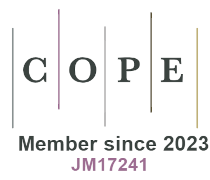On economic security and the Solvency II Directive
DOI:
https://doi.org/10.18778/2082-4440.30.01Keywords:
economic security, insurance industry, lawAbstract
The purpose of the article is an attempt to evaluate the economic security of European Union countries from the perspective of the ongoing COVID-19 pandemic and to present the Solvency II Directive as an instrument to support the authorities of the Community countries in their pursuit of preserving economic security.
Hypothesis: alleviating the regulatory regime of the Solvency II Directive contributes to improving the economic situation of European Union countries.
Method: for the purposes of the study, the literature on the subject was reviewed, and data analysis was performed on the reports of Insurance Europe, OECD, and the European Commission.
Conclusion: The research indicates that there are substantive premises that justify the necessity to amend the Solvency II Directive to support the economic situation of the countries. In the face of the shocking changes in economic conditions caused by the COVID-19 pandemic, alleviating the Directive’s provisions will ultimately have a positive effect on the economic situation of the Community countries. However, this decision remains in the sphere of possible choice of European authorities.
References
Ambitions for Europe – Overview (2020), https://insuranceeurope.eu/ambitions-europe-overview (data dostępu: 15.05.2020).
Google Scholar
Arena M. (2008), Does insurance market activity promote economic growth? A cross-country study for industrialized and developing countries, „Journal of Risk and Insurance”, 75(4).
Google Scholar
DOI: https://doi.org/10.1111/j.1539-6975.2008.00291.x
A risk-based regime for Europe (2020), https://www.insuranceeurope.eu/solvency-ii (data dostępu: 3.06.2020).
Google Scholar
Borkowski M. (2019), Bezpieczeństwo ekonomiczne Szwecji na tle państw OECD, „Studia Ekonomiczne, Zeszyty Naukowe Uniwersytetu Ekonomicznego w Katowicach”, 379.
Google Scholar
Chen P.F., Lee Ch.Ch., Lee Ch.F. (2012), Insurance market activity and economic growth: An international cross-country analysis, „Journal of International Development”, 7(24).
Google Scholar
DOI: https://doi.org/10.1002/jid.1765
Coronavirus Pandemic to Slow Austria’s Insurance Market Growth (2020), https://www.fitchratings.com/research/insurance/coronavirus-pandemic-to-slow-austria-insurance-market-growth-27-05-2020 (data dostępu: 8.06.2020).
Google Scholar
Cristea M., Marcua N., Cârstina S. (2014), The Relationship between Insurance and Economic Growth in Romania Compared to the Main Results in Europe – A Theoretical and Empirical Analysis, „Procedia Economics and Finance”, 8.
Google Scholar
DOI: https://doi.org/10.1016/S2212-5671(14)00085-9
Delivorias A., Scholz N. (2020), Economic impact of epidemics and pandemics, https://www.europarl.europa.eu/RegData/etudes/BRIE/2020/646195/EPRS_BRI(2020)646195_EN.pdf, PE 646.195 (data dostępu: 15.04.2020).
Google Scholar
EIOPA (2020), EIOPA: wskazówki dla sektora ubezpieczeniowego w związku z pandemią COVID-19, Europejski Urząd Nadzoru Ubezpieczeń i Pracowniczych Programów Emerytalnych, http://www.beinsured.pl/artykuly/eiopa-wskazowki-dla-sektora-ubezpieczeniowego-w-zwiazku-z-pandemia-covid-19,6695.html (data dostępu: 1.06.2020).
Google Scholar
Finance Sustainable EU Economic Growth (2020), https://insuranceeurope.eu/sites/default/files/attachments/Ambitions%20for%20Europe%20-%20Finance%20sustainable%20EU%20economic%20growth.pdf (data dostępu: 3.06.2020).
Google Scholar
Global Financial Stability Report (2020), International Monetary Fund, https://www.imf.org/en/Publications/GFSR/Issues/2020/04/14/global-financial-stability-report-april-2020 (data dostępu: 15.04.2020).
Google Scholar
Global Insurance Trends and Forecasts, https://www.mckinsey.com/industries/financial-services/our-insights/2019-global-insurance-trends-and-forecasts (data dostępu: 17.05.2020).
Google Scholar
Gospodarka i miejsca pracy podczas pandemii koronawirusa, https://ec.europa.eu/info/live-work-travel-eu/health/coronavirus-response/jobs-and-economy-during-coronavirus-pandemic_pl (data dostępu: 3.06.2020).
Google Scholar
Haegeli J.J. (2019), Global insurance premiums exceed USD 5 trillion for the first time as pivot east continues, Swiss Re Institute’s latest sigma says, https://www.swissre.com/media/news-releases/nr-20190704-sigma-3-2019.html (data dostępu: 13.05.2020).
Google Scholar
Haiss P., Sü meg K. (2008), The relationship between insurance and economic growth in Europe: a theoretical and empirical analysis, „Empirica”, 35.
Google Scholar
DOI: https://doi.org/10.1007/s10663-008-9075-2
Handschke J., Monkiewicz J. (red.) (2010), Ubezpieczenia. Podręcznik akademicki, Poltex, Warszawa.
Google Scholar
Jonas O. (2013), Pandemic Risk, The World Bank, https://www.worldbank.org/content/dam/Worldbank/document/HDN/Health/WDR14_bp_Pandemic_Risk_Jonas.pdf (data dostępu: 2.06.2020).
Google Scholar
Kołodko G.W. (2011), Świat między kryzysami – wstęp do wydania polskiego [w:] N. Roubini, S. Mihm, Ekonomia kryzysu, Wydawnictwo Wolters Kluwer, Warszawa.
Google Scholar
Kostecka-Tomaszewska L. (2018), Economic security of China: The implications of the belt and road initiative, „Optimum Economic Studies”, 4(94).
Google Scholar
DOI: https://doi.org/10.15290/oes.2018.04.94.14
Levine R., Loayza N., Beck T. (2000), Financial intermediation and growth: causality analysis and causes, „Journal of Monetary Economics”, 46(1).
Google Scholar
DOI: https://doi.org/10.1016/S0304-3932(00)00017-9
Mkrtchyan T.M. (2015), State Economic Security System and Its Components, 4th Int’l Conference on Research in Humanities, Sociology & Corporate Social Responsibility (RHSCSR’15) Sept. 25–26, 2015 Penang (Malaysia), https://icehm.org/upload/3757ED915013.pdf (data dostępu: 15.05.2020).
Google Scholar
Moorcraft B. (2020), Fitch Ratings: COVID-19’s negative impact on the global insurance industry, https://www.insurancebusinessmag.com/asia/news/breaking-news/fitch-ratings-covid19s-negative-impact-on-the-global-insurance-industry-220124.aspx (data dostępu: 25.05.2020).
Google Scholar
Nye J.S. (1974), Collective Economic Security, „International Affairs”, 50(4), Oxford University Press on behalf of the Royal Institute of International Affairs Stable, https://www.jstor.org/stable/2615925 (data dostępu: 1.04.2020).
Google Scholar
DOI: https://doi.org/10.2307/2615925
Outreville J.F. (1990), The Economic Significance of Insurance Markets in Developing Countries, „The Journal of Risk and Insurance”, 57(3).
Google Scholar
DOI: https://doi.org/10.2307/252844
Poirson H. (1998), Economic Security, Private Investment, and Growth in Developing Countries, Working Paper, International Monetary Fund, WP/98/4.
Google Scholar
DOI: https://doi.org/10.5089/9781451842012.001
Pradhan R.P. i in. (2017), Insurance – growth nexus and macroeconomic determinants: evidence from middle-income countries, „Empirical Economics”, 52(4).
Google Scholar
DOI: https://doi.org/10.1007/s00181-016-1111-7
Roubini N. (2020), Coronavirus pandemic has delivered the fastest, deepest economic shock in history, https://www.theguardian.com/business/2020/mar/25/coronavirus-pandemic-has-delivered-the-fastest-deepest-economic-shock-in-history (data dostępu: 31.03.2020).
Google Scholar
Skipper H.D. (1997), Foreign Insurers in Emerging Markets: Issues and Concerns, Occasional Paper 97-2, Center for Risk Management and Insurance.
Google Scholar
Solvency II 2020 review: why would one of the world’s most prudent and conservative prudential regimes need “prudential enhancements”? (2020), https://www.insuranceeurope.eu/solvency-ii-2020-review-why-would-one-world-s-most-prudent-and-conservative-prudential-regimes-need (data dostępu: 8.06.2020).
Google Scholar
Stachowiak Z., Stachowiak B. (2014), Kontrowersje i dylematy rozwiązania problemu bezpieczeństwa ekonomicznego w Polsce, „Ekonomia bezpieczeństwa i logistyka, Zeszyty Naukowe AON”, 3(96).
Google Scholar
The Council of Economic Advisers (2019), Mitigating the Impact of Pandemic Influenza through Vaccine Innovation, https://www.whitehouse.gov/wp-content/uploads/2019/09/Mitigating-the-Impact-of-Pandemic-Influenza-through-Vaccine-Innovation.pdf (data dostępu: 15.04.2020).
Google Scholar
The drive for transformation and growth, 2020 Global Insurance Outlook (2020), https://www.ey.com/Publication/vwLUAssets/Insurance_outlook/$FILE/eyglobal-insurance-outlook.pdf (data dostępu: 23.04.2020).
Google Scholar
US insurance market trends during the pandemic, https://www.mckinsey.com/industries/financial-services/our-insights/us-insurance-market-trends-during-the-pandemic (data dostępu: 8.06.2020).
Google Scholar
Waite H.M. (1935), Economic Security, „Journal (American Water Works Association), Wiley”, 27(8), https://www.jstor.org/stable/41226407 (data dostępu: 1.04.2020).
Google Scholar
DOI: https://doi.org/10.1002/j.1551-8833.1935.tb18487.x
Ward D., Zurburegg R. (2003), Does Insurance Promote Economic Growth? Evidence form OECD Countries, „Journal of Risk and Insurance”, 67(4).
Google Scholar
DOI: https://doi.org/10.2307/253847
Downloads
Published
How to Cite
Issue
Section
License

This work is licensed under a Creative Commons Attribution-NonCommercial-NoDerivatives 4.0 International License.









